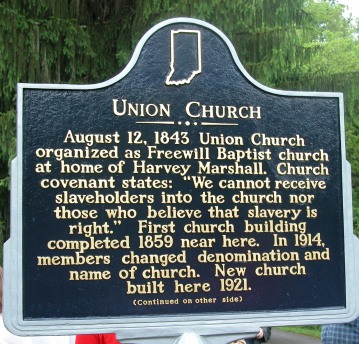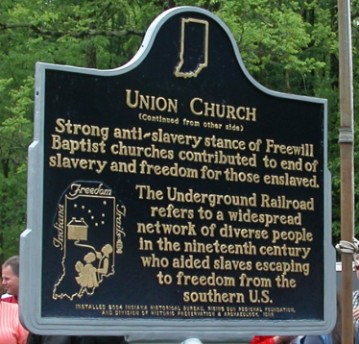

Location: Union Flat Rock Baptist Church, 6303 CR 975 W - CR 975 W and Flat Rock Road/CR 650 N, Flat Rock. (Ripley County, Indiana)
Installed: 2004 Indiana Historical Bureau, Rising Sun Regional Foundation, and Division of Historic Preservation & Archaeology, IDNR
ID# : 69.2004.1
Text
Side one:
August 12, 1843 Union Church organized as Freewill Baptist church at home of Harvey Marshall. Church covenant states: "We cannot receive slaveholders into the church nor those who believe that slavery is right." First church building completed 1859 near here. In 1914, members changed denomination and name of church. New church built here 1921.
Side two:
Strong anti-slavery stance of Freewill Baptist churches contributed to end of slavery and freedom for those enslaved. The Underground Railroad refers to a widespread network of diverse people in the nineteenth century who aided slaves escaping to freedom from the southern U.S.
Keywords
Underground Railroad, African American
Annotated Text
The digitized sources for many of the notes below can be found here.
Side one:
August 12, 1843 Union Church organized as Freewill Baptist church at home of Harvey Marshall.(1) Church covenant states: "We cannot receive slaveholders into the church nor those who believe that slavery is right."(2) First church building completed 1859 near here.(3) In 1914, members changed denomination and name of church.(4) New church built here 1921.(5)
Side two:
Strong anti-slavery stance of Freewill Baptist churches contributed to end of slavery and freedom for those enslaved. The Underground Railroad refers to a widespread network of diverse people in the nineteenth century who aided slaves escaping to freedom from the southern U.S.
Notes:
(1)Record of Union Church, August 12, 1843, [1-3]. Photocopy of portion of original, pp. [1] through [15] (August 12, 1843 to March 16, 1844). Original in possession of Don Hughes, descendant of church member, David H. Hughes. First members of Union Church included Warren Roberts, Mary Roberts, Harvey Marshall, Eunice Marshall, Joseph Judd, Polly Judd, Sally Adams, William Stagg, Lawry [Laura] Marshall, Martha Marshall. Record of Union Church, [3-4].
The Freewill Baptist denomination strongly opposed slavery. Rev. John Robinson, The Testimony and Practice of the Presbyterian Church in Reference to American Slavery with an Appendix: containing the Position of the General Assembly (New School), Free Presbyterian Church, Reformed Presbyterian . . . Baptist, Protestant Episcopal, and Methodist Episcopal churches (Cincinnati, 1852), 251-52.
(2)This is the 7th statement of the covenant. Record of Union Church, [10].
There is evidence that one minister acted on that principle. In November, 1846, the cabin of a Freewill preacher named Courtney provided shelter to freedom seekers being conducted by John H. Tibbets of Jefferson Co. Indiana. John H. Tibbets, Reminiscences of Slavery Times Written by Grandfather Tibbets in his 70th Year (Historic Eleutherian Inc., Madison, Ind.), photocopy, [4-5].
The U.S. Bureau of Census 1850 lists John Courtney in Otter Creek Township, Ripley County, Indiana.
On October 18, 1845, Elder John Courtney was called to replace Ichabod Sheldon as pastor. "A History of Union Freewill Baptist Church, " in Violet Toph, comp. People's History of Ripley County, Indiana, 5 vols. (Fort Wayne, Ind., 1969), 3:1272-73.
This history was loaned to Toph by David H. Hughes, circa 1928. It seems to be derived from the Record of the Union Church, cited in note 1. A version of this history—The History of Union Flat Rock American Baptist Church, 1843-1993—was published for the church's sesquicentennial celebration.
(3)On October 1, 1853, the first building committee was appointed; ground for church was donated by Joseph Judd, Sr.; the church building was started in 1854 and was in use before completion in 1859. Toph, 3:1272-73.
Apparently the donated land had not been properly conveyed in 1853. An 1885 report found that Union Church had no deed and no elected trustees. An April, 1886 committee reported that a deed for the church lot had been recorded as well as the certification of election for trustees. Toph, 3:1278.
On April 29, 1886, Alfred Judd and Emma Judd conveyed 1/4 acre of land, more or less, to the Freewill Baptist denomination in care of the trustees. The land was located in SW 1/4, Section 5, T8N, R10E. Ripley County, Deed Book 57, 499-500. Photocopy. In 1837, Joseph Judd (listed in note 1) purchased land in Jackson Township, Ripley County, Southwest 1/4, Section 5 (and east 1/2, Section 6) in Township 8N, Range 10E. Ripley County, Deed Book F, 408-09.
(4)In 1914, remaining members voted to join the Missionary Baptist denomination; church now called Union Flatrock Baptist Church; became member of Sand Creek Baptist Association. Toph, 3:1308. In 1906, the State Freewill Baptist Association became the "Missionary Baptist" denomination. Toph, 3:1295. On September 18, 1909, the last covenant meeting was held at Union Church. Toph, 3:1295. For five years following 1909, the church held no business meetings and no records were kept. Toph, 3:1307.
From December 23, 1919 through January 2, 1920, the last meetings were held in the original church building. The new church could not be built on the old church ground because the depth of soil was insufficient for a basement. The church purchased a plot of ground just south of old building. The old building was vacated in late May 1920. Toph, 3:1313.
(5)On December 21, 1921, the first meeting took place in new church building. Toph, 3:1315.
